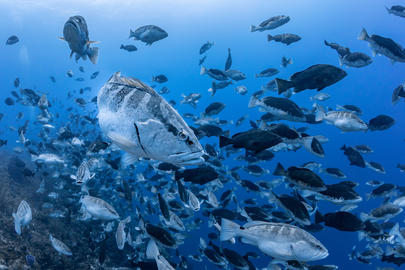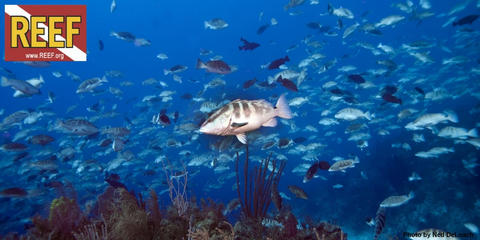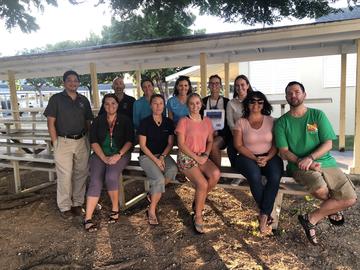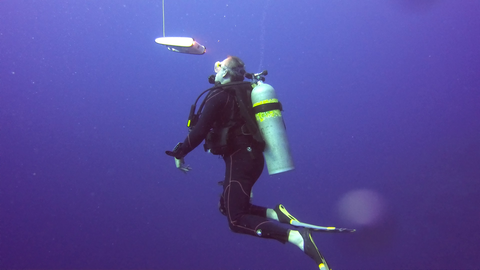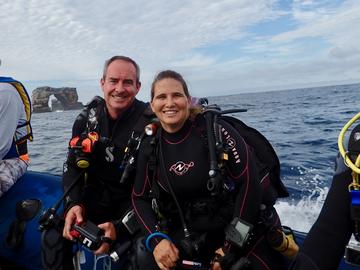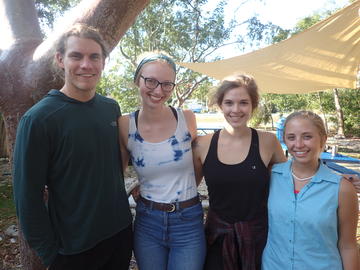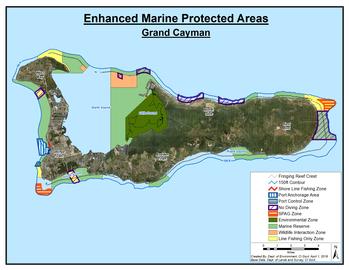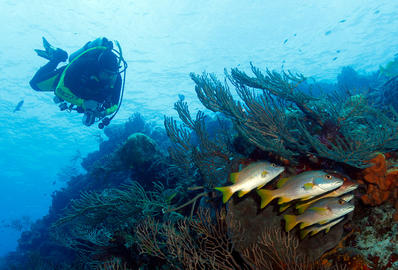While everyone knows that marine mammals are well known sound producers, did you know that many fish species also produce and use sound to sense their environment? Marine environments are teeming with underwater sounds from animals, human activities (shipping, costal development, oil and gas exploration etc.), and geological processes such as rain, wind, and water flow. The combination of the sounds, called a soundscape, can be used to study the ecology of animals that produce, hear, or respond to sound.
Current search
Search found 15 items
- Grouper moon project 2019
REEF scientists and volunteers are gearing up another season of the Grouper Moon Project, a collaborative research effort with the Cayman Islands Department of the Environment (CIDOE). This important project focuses on one of the largest (and one of just a few) known spawning aggregations of Nassau Grouper in the Caribbean. Over 6,000 grouper amass in one location for 7-10 days following winter full moons.
In November 2019, REEF and the Cayman Islands Department of the Environment (DOE) presented Grouper Education Program teacher workshops on Grand Cayman and Cayman Brac in the Cayman Islands. The workshops, led by Grouper Moon educator, Todd Bohannon, and Bradley Johnson from DOE, provided educators with a marine science curriculum based on the Grouper Moon Project for intermediate/elementary and high school students.
Thanks to the generous support of OpenROV and National Geographic, REEF received two Trident remotely-operated vehicles (ROVs) to advance our research on endangered Nassau Grouper and invasive lionfish.
KEY LARGO, FLA. – Dr. Christy Pattengill-Semmens, REEF’s Director of Science, and Dr. Brice Semmens, Director of California Cooperative Oceanic Fisheries Investigations and associate professor at Scripps Institution of Oceanography, UC San Diego, have been selected as Scuba Diving magazine’s April 2019 Sea Heroes. Sponsored by the watch brand Seiko, this award honors the extraordinary work done by scuba divers making a difference for our world’s oceans, reefs, and marine life.
We are very proud to share that Dr. Christy Pattengill-Semmens, REEF Director of Science, and Dr. Brice Semmens, Director of California Cooperative Oceanic Fisheries Investigations and associate professor at Scripps Institution of Oceanography, UC San Diego, have been named Scuba Diving magazine’s April 2019 Sea Heroes! Sponsored by the watch brand Seiko, this award honors the extraordinary work done by scuba divers making a difference for our world’s oceans, reefs and marine life.
We are very proud to share that Dr. Christy Pattengill-Semmens, REEF Director of Science, and Dr. Brice Semmens, Director of California Cooperative Oceanic Fisheries Investigations and associate professor at Scripps Institution of Oceanography, UC San Diego, have been named Scuba Diving magazine’s April 2019 Sea Heroes! Sponsored by the watch brand Seiko, this award honors the extraordinary work done by scuba divers making a difference for our world’s oceans, reefs and marine life.
We’re excited to introduce our Spring 2019 Marine Conservation Interns. These individuals will support the REEF team in mission-oriented tasks and daily office operations, as well as play an integral role in the many education and outreach programs that take place throughout the spring semester. They will also have opportunities to scuba dive, conduct fish surveys, and volunteer with environmental organizations in South Florida and the Florida Keys. This semester’s interns bring diverse skills and interests to REEF. They include:
We are very excited to share some great news from our Grouper Moon Project colleagues at Cayman Islands Department of Environment (DOE) – on April 1, 2019, the Cabinet of the Cayman Islands approved the most significant expansion and enhancement to Cayman’s existing marine parks system since the areas were established in 1986. The “no take” zones, including marine parks/reserves, environmental zones, and wildlife interaction zones, will increase from a national average of approximately 14% to 48%.
Cozumel is known for its many unique fish finds including the Cozumel-endemic Splendid Toadfish as well as high concentrations of other interesting species like Cherubfish, Blackcap Basslets, and Sargassum Triggerfish. When not diving, you will enjoy all the wonderful food and culture that Mexico has to offer, as well as daily seminars by Cozumel local and fish id expert Tracey Griffin. Reserve your spot today because this popular trip is sure to sell out quickly.

